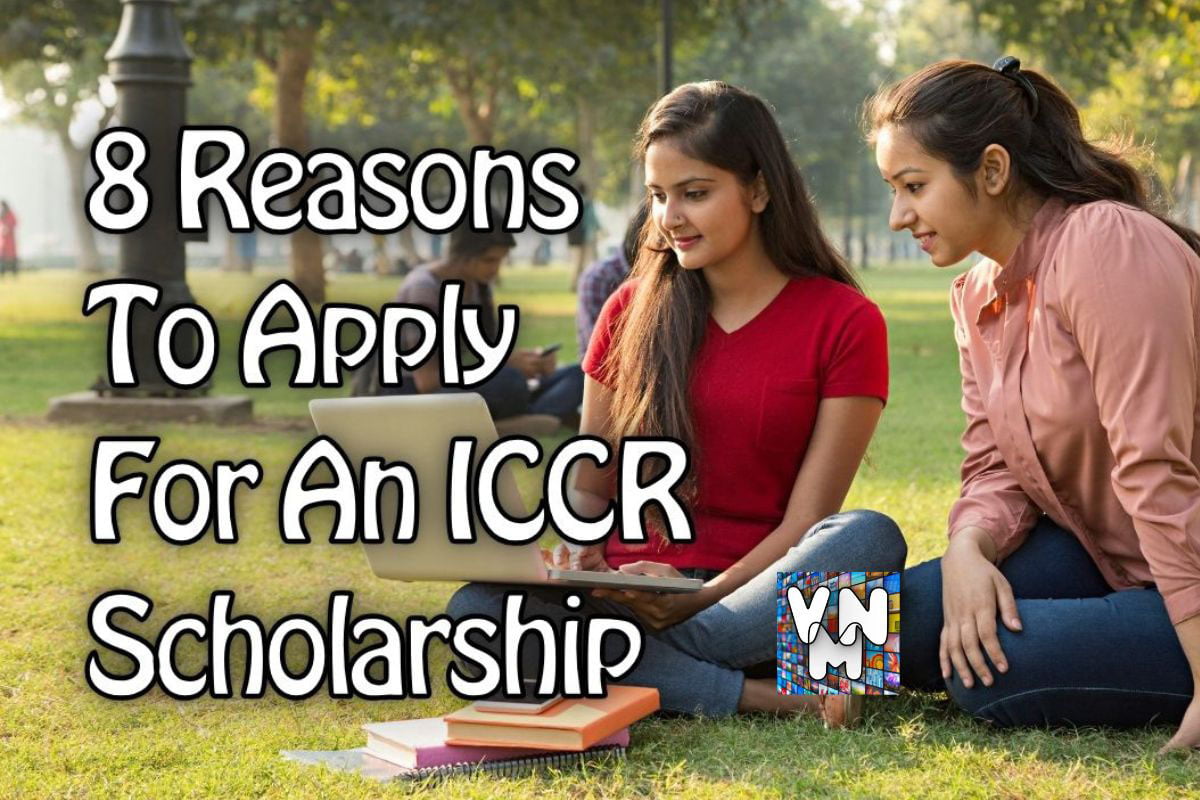8 Reasons To Apply For An ICCR Scholarship
ICCR Scholarships
8 Reasons To Apply For An ICCR Scholarship, The Indian Council for Cultural Relations (ICCR) Scholarships is a prestigious initiative by the Government of India to promote cultural exchange and strengthen diplomatic ties between India and other countries. ICCR scholarships are offered to foreign students from various countries to pursue undergraduate, postgraduate, and doctoral programs in various fields in Indian universities and colleges.
8 Reasons To Apply For An ICCR Scholarship
1. Quality Education:
ICCR scholars have the opportunity to study in some of India’s most prestigious universities and institutions. These organizations are well known for their scholastic excellence, thorough educational curriculum, and elite faculty. These teachers frequently have broad research backgrounds and significant knowledge so they can offer quality mentorship to students.
Numerous colleges associated with ICCR scholarships are at the very front of research and development. State of the art labs, research centers, and assets are available to students, permitting them to participate in significant research projects.
2. Cultural Immersion:
India is incredibly diverse, with a rich tapestry of cultures, languages, traditions, and customs. ICCR scholars have the opportunity to immerse themselves in this diversity, experiencing the unique cultural heritage of various regions across the country. Many ICCR programs offer language courses to help international students learn Indian languages such as Hindi, Bengali, Tamil, or others. Communication is enhanced and cultural understanding is deepened through learning the local language.
India is known for its energetic celebrations, including Diwali, Holi, Eid, Durga Puja, and numerous others, which ICCR researchers are frequently welcomed to partake in, furnishing them with firsthand experience of the social and religious variety of the country.

3. Financial Support:
One of the primary components of the ICCR scholarship is the coverage of tuition fees. The scholarship pays for the academic expenses, ensuring that scholars do not have to worry about the cost of their education. ICCR scholarships often cover accommodation expenses. Scholars can either stay in university hostels or, in some cases, with local host families. This financial support ensures that scholars have a safe and secure place to live during their studies.
ICCR scholars receive a monthly stipend to cover their living expenses. This stipend is designed to help with daily costs such as food, transportation, and personal necessities. It ensures that scholars can focus on their studies without financial strain.
4. Research Opportunities:
ICCR scholars have the privilege of studying at some of India’s top universities and research institutions. These institutions often have state-of-the-art facilities and a vibrant research community, providing scholars with an intellectually stimulating environment. Many Indian universities and research centers collaborate with international institutions.
ICCR scholars can actively participate in these collaborative research projects, working with Indian and international scholars. This collaboration enhances the quality and scope of research opportunities.
5. Language Skills:
Many ICCR scholarship programs include language courses, especially for students whose native language is not English. These courses are designed to improve the students’ proficiency in the English language, which is the medium of instruction in most Indian universities. Intensive language training programs help students enhance their speaking, listening, reading, and writing skills.
Immersion is one of the most effective ways to learn a language. Living and studying in an environment where the language is spoken daily provides ICCR scholars with constant exposure to the language. This immersion accelerates the learning process and helps students become more fluent and confident in their communication skills.
6. Networking Opportunities:
ICCR scholarships attract students from diverse countries and backgrounds. Interacting with peers from different cultures fosters a global perspective and understanding. Scholars learn to appreciate cultural differences, enhancing their cross-cultural communication skills.
ICCR scholars form a tight-knit international community. These connections provide a global network of friends and potential future colleagues. Sharing experiences with fellow scholars creates bonds that often last a lifetime and can be professionally beneficial.

7. Cultural Ambassadorship:
ICCR scholars represent the cultural diversity of their home countries. By immersing themselves in Indian culture and traditions, they act as cultural bridges, facilitating the exchange of ideas, values, and traditions between India and their native countries. ICCR organizes various cultural events, festivals, and workshops where scholars showcase their own cultures and traditions. This participation not only enriches the Indian cultural landscape but also helps scholars share their heritage with the Indian community, fostering cross-cultural appreciation.
Scholars often become proficient in Indian languages, especially English, during their studies. This linguistic ability enhances their communication skills and allows them to effectively convey the nuances of their culture to Indian peers, promoting cultural dialogue.
8. Global Perspective:
ICCR scholars come from diverse backgrounds, representing various countries, cultures, religions, and traditions. Interacting with peers from different parts of the world exposes scholars to a rich tapestry of cultures, enhancing their understanding and appreciation for global diversity. Studying in India exposes scholars to different teaching methods, academic disciplines, and research approaches. Exposure to Indian education, which often incorporates ancient knowledge systems alongside modern studies, broadens scholars’ perspectives on learning and knowledge acquisition.
Many ICCR scholars improve their language skills, especially in English, which is widely used as the global language of communication. Enhanced language proficiency allows scholars to communicate effectively with people from various linguistic backgrounds, fostering international dialogue.
How To Apply For An ICCR Scholarship
Applying for an ICCR (Indian Council for Cultural Relations) scholarship involves several steps. While the specific application process might vary depending on the country and the type of scholarship you are applying for, here is a general guideline to help you understand how to apply for an ICCR scholarship:
Eligibility Criteria:
Check the eligibility criteria for the specific ICCR scholarship you are interested in. Different scholarships have different eligibility requirements in terms of academic qualifications, age, and nationality.

Research Scholarships:
If you are applying for a research scholarship, you need to have a research proposal outlining your intended area of study and research objectives.
Online Application:
Visit the official ICCR website or the website of the Indian Embassy/High Commission in your country. Look for the scholarship section.
Fill out the online application form. Make sure to provide accurate and complete information.
Upload the required documents, which may include academic transcripts, letters of recommendation, a statement of purpose, proof of language proficiency, passport-sized photographs, and a copy of your passport.
Recommendation Letters:
Obtain recommendation letters from teachers, professors, or employers, as per the scholarship requirements. Ensure these letters are signed and on official letterheads.
Language Proficiency:
If the scholarship requires proficiency in English, you might need to provide scores from English language proficiency tests such as IELTS, TOEFL, or others. Make sure your scores meet the required criteria.
Submission Deadline:
Be aware of the application deadline. Submit your application and all the required documents well before the deadline to avoid any last-minute issues.
Interview (if applicable):
Some ICCR scholarships might require you to attend an interview. Prepare for the interview by researching commonly asked questions and understanding the scholarship and the course you are applying for.
Wait for the Results:
After the application deadline, the selection committee will review the applications. Wait for the results to be announced. If you are selected, you will receive an official communication from ICCR or the Indian Embassy/High Commission.
Visa Application:
Once you are selected for the scholarship, you will receive a scholarship confirmation letter. Use this letter to apply for a student visa at the nearest Indian Embassy/Consulate.
Pre-departure Preparation:
After obtaining the visa, prepare for your journey to India. Arrange for travel, accommodation, and other necessary arrangements.
ICCR Scholarships
ICCR scholarships not only facilitate higher education for international students but also promote cross-cultural understanding and goodwill. By providing opportunities for students from diverse backgrounds to study in India, ICCR contributes significantly to global education and cultural exchange, fostering mutual respect and cooperation among nations.
You have to wait 35 seconds.
Related
Related posts
Categories
- Accident Lawyers (19)
- Adventure (1)
- Art (7)
- Author (24)
- Books (34)
- Business (32)
- Celebrity News (8)
- Debt (6)
- Design (3)
- Economy (11)
- Educational info (74)
- Events (11)
- Fashion (7)
- Filmmakers (8)
- Food (29)
- Gaming (10)
- Guide (7)
- Health & Beauty (43)
- Home (41)
- Insurance (8)
- Interior (1)
- Life (1)
- Lifestyle (5)
- Loans (11)
- Mortgage Loans (5)
- Motivation (4)
- Music (10)
- Parenting (1)
- People (3)
- Pets (5)
- Photography (4)
- Podcasts (5)
- Politics (2)
- Products (23)
- Relationships (3)
- Review (1)
- Scholarship (15)
- Student Loan (3)
- Style (1)
- Tax Lawyer (3)
- Tech (58)
- Travel (30)
- TV And Film (2)
- Uncategorised (8)
- Uncategorized (9)
Subscribe Now
* You will receive the latest news and updates on your favorite celebrities!


Social Media